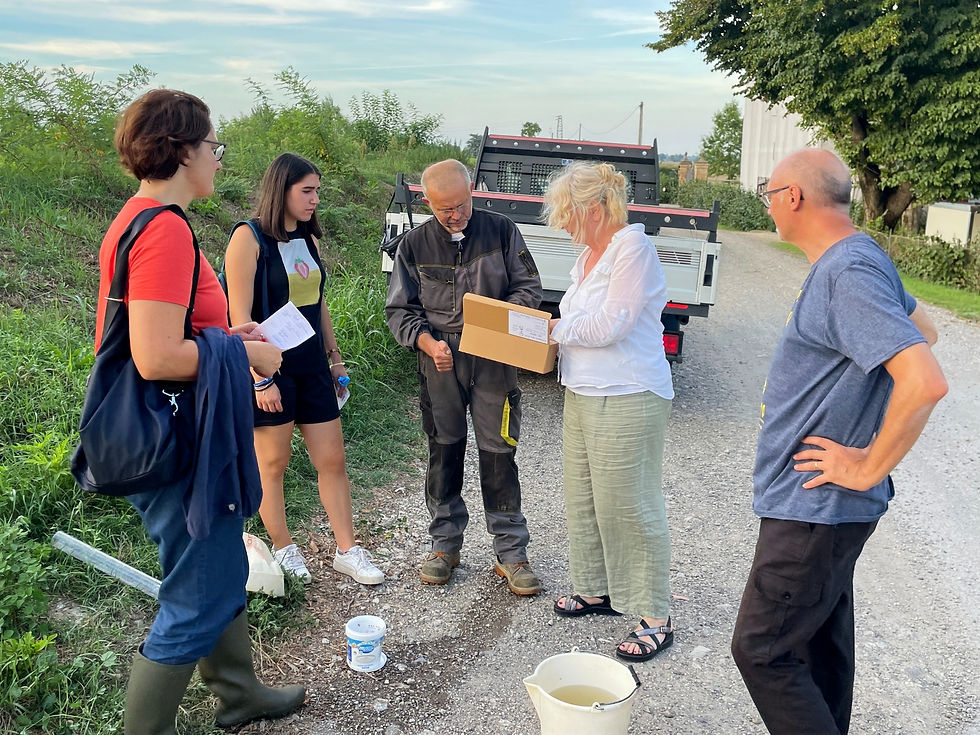When in Rome...
- Ashley Eugley

- Aug 20, 2022
- 4 min read
Updated: Sep 18, 2022
Three weeks have passed since I embarked on my Watson Fellowship. I am currently in Rome, Italy. While I am here, I hope to study the city's air quality, citizen-based air monitoring initiatives (such as Cittadini per L'aria) and environmental justice topics (I am very interested in the work by Sensing for Justice, an organization that—among many other duties—is pushing to have civic monitoring qualify as a source of evidence in environmental litigation). More to come on these topics, but in the meantime, here are some sights I've encountered around the city, and some contemplations on solitude, travel, and self.

Via di Santa Maria Maggiore

Basilica Papale di Santa Maria Maggiore
Constructed in the 5th Century AD
El Colosseo
Constructed between 72 and 80 AD
Vittoriano (Altare della Patria) and Views of Rome
Constructed between 1885 and 1935
Simultaneous Differentiation and Universalization
Prior to departing on my Watson Year, I convinced myself that everything would be different. This was a thought that was both exhilarating and terrifying; it was a vision that was full of hope and promise for new discovery, and fear that I would feel out of place for the entirety of my time abroad. Now that I've spent some time away, I'd like to make this statement more nuanced.
Everything is most certainly not different in function, even if it may have a different form or ritual attached to it. No matter where you are, people still cook and consume food, play games, curse at pedestrians and poor drivers, and form communities (among an infinite number of other conventions). For example, even on Gozo—a small island in the middle of the Mediterranean Sea—people play bingo (albeit a slightly different version), win money, and complain when they go home empty-handed. It's almost like being transported across time and space when you find pieces of home and recall memories from elsewhere in situations that are far, far away from what is familiar.
Travel has assured me of the universality of the human condition, as cliché as that may sound. Hardship, celebration, tradition, friendship, love, and happiness (I could continue, but you catch the drift) are ubiquitous. They may take on different forms, offer diverse manifestations, or diverge from one's expectations, but they are always there. Travel may thus be understood as a process of simultaneous differentiation and universalization, simply put: witnessing and adapting to "the same but different" in new places.
This assertion is not intended to undermine the unique traditions, cultures, languages, spiritualities, values, and so fourth that characterize different places, nor does it aim to suggest that everything is the same everywhere. Rather, embracing the idea that universals coexist with and within perceived or actual differences has enabled me to move towards a deeper understanding of the places I visit, the events I witness, and the people I meet, making for a much more robust experience of "elsewhere."
On Solitude
Traveling alone is simple in all of the ways you'd want it to be, but complex in ways you may not anticipate. For better or worse, there is no negotiation, no coordination, and no collaboration. Solitude offers a heavier kind of freedom, one that is laden with responsibility, self-reliance, and bravery. It requires as much confidence, self-assurance, and persistence as you can offer it. This is a kind of freedom that looks different each day; it is one that shrinks when you find refuge in familiar spaces, and grows when you embrace new opportunities.
Instead of treating solitude, loneliness, freedom, and independence as roadblocks to comfort and happiness, I am choosing to treat them as necessary components of growth. I have found hope in my solitude, self-discovery in my loneliness, and self-reliance in my freedom and independence. I am learning to be comfortable with uncertainty and am becoming more of a realist.
As I wrote in my journal a few days ago, "I want to experience all of the layers of life, and I cannot do that without the valleys in between the peaks—low moments in liminal spaces, excessive contemplation, oppressive self-awareness and waning self-assurance—valleys that challenge me, force me to question my assumptions, and push me to grow. To live is to indulge polarities, to cultivate uncertainty, and to open one's arms to both valleys and peaks, knowing that without one, you cannot experience the other... I am a blank canvas, a piece of clay, and perhaps a sponge. I am "not yet" because life is a process of constant becoming, not merely a state of being. My solitude, loneliness, and independence do not define me nor hinder me. They offer new possibilities that stretch my imagination and reshape my understanding. They are a gift."
"But how are you really doing?"
Reflecting on previous blog posts, I realized that my words lacked vulnerability. I believe part of this was because I was struggling to decode my emotional ambiguity—to reconcile my gratitude with my discomfort and my hope with my fear. I can say with confidence that the past three weeks have shifted my outlook, pushed me to grow, and humbled me. Every day I experience a range of emotions, and every day I make space for this range of emotions, knowing that having expectations about how I should feel/think in circumstances I have never encountered is unrealistic. Although some moments are tough and consuming—leading me to question myself, my worthiness of a Watson Fellowship, and my abilities—I am generally full of gratitude, excitement, and curiosity for what is yet to come. Time is flying, and each day is full of choices and opportunities. I am giving myself permission to take my time while also making the most of each moment. TLDR: I am doing well!





























my favorite post yet <3 you inspire me, love you always!
I love reading your blogs. I am living vicariously through you in this experience. Please keep Sharing . So proud of you.